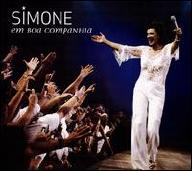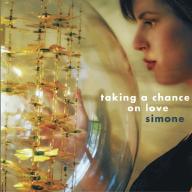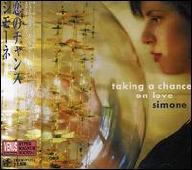Daughter of an opera singer and a female pianist, Simone moved to São Paulo at 16, pursuing a career as a basketball player (she even was a member of the national team). She recorded her first LP, Simone, in 1973. She was invited by Hermínio Bello de Carvalho to perform in Brussels, Belgium, and Paris, France, and recorded the live albums Simone et Roberto Ribeiro Avec João de Aquino à Bruxelles and Expo-Som 73 - Ao Vivo - Márcia, Leny Andrade, Simone, e Ary Vilela. Next came a tour through the U.S. and Canada. With João de Aquino, recording the live album Festabrasil - Simone e João de Aquino. The second LP came in 1975, Quatro Paredes, having hits with songs by João Bosco/Aldir Blanc. The first big radio hits were "Jura Secreta" (Sueli Costa/Abel Silva) and "Face a Face" (Sueli Costa/Cacaso). In 1976, she recorded "O Que Será" (Chico Buarque), which was the theme of Cacá Diegues's film #Dona Flor e Seus Dois Maridos. She had "Cigarra" (of the homonymous LP, of 1978) written specially for her by Milton Nascimento/Fernando Brant. In 1979, she had her greatest hit with "Começar de Novo" (Ivan Lins/Vitor Martins), which was included in the Malu Mulher TV Globo series. The song was included in the Pedaços LP, which also had "Tô Voltando" (Maurício Tapajós/Paulo César Pinheiro), a representative song of the period of the end of the military regimen and of the advent of political amnesty. In 1980, she re-recorded another political song, the pacifist anthem "Pra Não Dizer Que Não Falei Das Flores" (Geraldo Vandré). She was the first artist to do so, as the song had been censored until then. She was the first singer to pack a stadium (Maracanãzinho) in 1981. In 1982, she brought 15,000 people each night to the Morumbi stadium (São Paulo). Simone was hired by the American CBS, recorded in the U.S, in the same year, being praised by critics. In that period, marked by huge success, she had hits with "Alma" (Sueli Costa/Abel Silva), "Tô Que Tô" (Kleiton/Kledir), "Um Desejo Só Não Basta" (Francisco Casaverde/Fausto Nilo), "Você é Real," and "Iolanda" (Pablo Milanéz/Chico Buarque). She released Café Com Leite in 1996; the CD was dedicated to Martinho da Vila's compositions, with the author sharing the track "Ex-Amor" with her.
Simone has continued to perform regularly in Brazil, Portugal, and the U.S. In 1997, she was included in the Sony Music Celebridades da MPB (MPB Celebrities) series (sharing the privilege with Ângela Maria, Sílvio Caldas, and Cauby Peixoto, with a four-CD box commemorating 25 years of her career (one year in advance). In 2000, she released Fica Comigo Esta Noite, with classics of the Brazilian romantic samba-canção repertory. ~ Alvaro Neder, Rovi


















